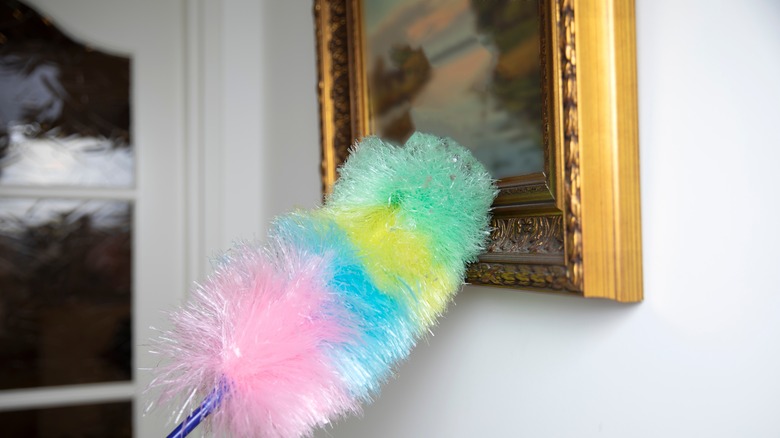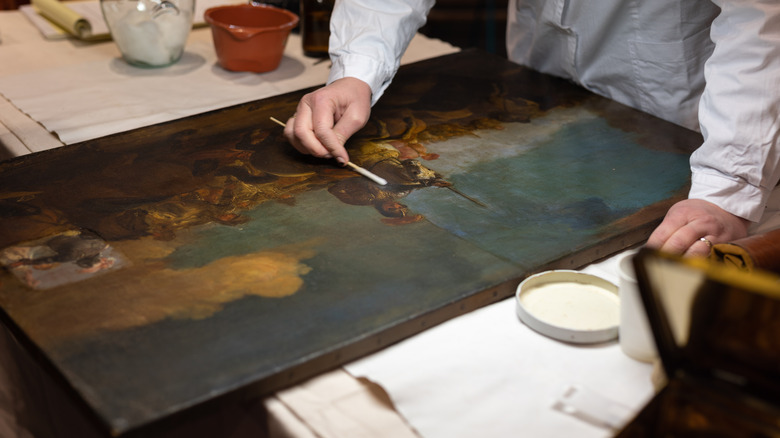Tips To Clean Your Treasured Oil Painting
There are many ways to beautify your house walls. You have the option of using this trick for DIYing wooden wall slats, employing the cleaning tool that helps install wallpaper, installing floating shelves, integrating mini bookcases, or hanging some form of contemporary art on it. However, one of the most classic ways you can add a unique touch to your house is by putting up oil paintings. Oil paintings are sophisticated because, unlike digital art, they were painted by hand, making them typically more expensive. However, just like any other decorative piece, you have to be on the lookout for when it gets dusty because you have to clean it. If you've never cleaned an oil painting before, there's no need to fret. Just go over it gently with a soft, clean duster or microfiber cloth to remove the built-up particles.
It probably never occurred to you to give your favorite oil painting a quick swipe clean, but it's necessary. Not cleaning them properly can lead to mold growth when spores land on them from either inside or outside. Fungi stains can settle on paintings and cause disfiguration or discoloration. People often make the mistake of not treating their oil paintings with care after they buy them, usually due to ignorance. If properly cared for, oil paintings can last generations, and, yes, there is a wrong way to clean them. To care for your oil painting is to know the best practices and abide by them faithfully.
What not to use to clean your oil painting
Oil paint is made up of pigments held together in an oil solvent. That bond can be broken if it's exposed to the right reagent. Several chemicals should never be used to wipe your paintings due to the risk of altering the paint and ruining the artwork. Even if your painting is extra dusty, resist the urge to use harsh chemicals on it, even water. Liquids such as alcohol, acetone, and even water can potentially do some damage.
Furthermore, stay away from using soaps and detergents as these are known to dissolve oils. Ammonia is also a strict no-no, as is vinegar. If you pay attention to your painting regularly, then you will know when it needs to be dusted so that it doesn't experience a grime buildup which would necessitate heavier cleaning.
Additionally, there are things you shouldn't do around your piece. You should refrain from smoking around your painting. This includes bringing candles close to it or even positioning it near a fireplace. Smoke leaves soot residue and the last thing you want is a blackened painting. Also, try to admire it with your eyes and not your hands. Your fingers have oil glands that produce sebum, an oil. Several types of bacteria and other micro-organisms exist on your fingertips and palms. Transferring them to the painting through continuous handling will only ruin its integrity.
The room and frame you keep the painting in matters
Owning an oil painting is a thing of pride but don't stop at purchasing and hanging it up on the wall. You have to consider two things if you want to ensure your artwork's longevity; your painting's location and framing. Even cleaning it frequently won't save it from the elements if you don't think about which room you keep it in and how you secure it in a frame.
Oil paintings hate direct sunlight. The paint that composes the artwork can melt under such exposure. Even if the paint doesn't deteriorate, the color can start to fade. The room and wall you keep the painting in should never be facing a window that brings in a lot of sunlight. In the same vein, you don't want to keep it in darkness as this can also affect the color quality. Keep the oil painting away from heat and humidity, too. This means kitchens and bathrooms are off-limits. High humidity can result in canvas disfigurement which would lead to the paint cracking. If it means investing in a dehumidifier, do so.
When it comes to framing your cherished piece, you can shield it in glass as long as it's UV-filtering glass and it isn't touching the painting's surface. Make sure you keep it away from bright light. LED lights are the best as they produce less heat. Cover the painting with cotton sheets when you want to protect it from the elements.


